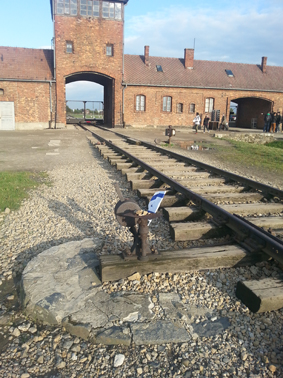 As made-up young men and women milled around the square during another evening of Stockholm Fashion Week, I stood in line to enter Stockholm Synagogue. The long queue reached into the snow-dusted square, breaking the sea of lipstick and new-old trends. In front and behind me were elderly people, a number of them most likely survivors, who chatted with their children and grandchildren, simply glad to be together and to be wearing warm coats and boots on this cold January evening. As the promises from politicians thundered from the stage to our left in pre-ceremony outdoor speeches about "never again", the generations waited together quietly to pay their respects. Inside the Synagogue, more speeches followed from the dignitaries. Most words or combinations of them seem like mice in the face of the monstrosity of the Holocaust that we remembered on this day, when Russian troops entered Auschwitz. As I prepare my manuscripts about dimensions of World War II that have touched my own life and as I reflect on the talks I have given about those dimensions, I become increasingly aware of how inadequate words are. At most, they can act as sign posts for what we know and feel. I tuned in and out of the speeches, but mostly observed the space and people inside the Synagogue. Although every last inch of standing room was occupied and the space is large, very many of the faces were easy for me to see. Some shut their eyes and asked the heavens for an answer, others bowed their heads under the weight of what they knew. Some nodded their agreement with one word or another, some were still and either listened to the words or their own thoughts. Whatever the outward differences between our ways of experiencing this moment, within all of us and outside the grand doors of the synagogue, down the steps lined by the walls with the names of the dead and into the square of youth, was the pain. It was and remains the thing that binds us and we should be grateful for it. A man with a full face and rich red beard smiled amid all of the sorrow. His smiling struck me not as an offence to the dignity of the event, rather as an honoring of life, the families that had perished and the bonds of love that endure. This was pain too, but it was a beautiful manifestation of it. Then the music came and a stunning voice expressed our mutual longing for a state of grace. I couldn't make out the words in Yiddish, but thought of another line from a Jewish composition that will never leave me. "Umacha Hashem dima me'al kol panim". God dry the tears on every face.
0 Comments
|
AuthorSee About. Archives
November 2023
Categories |
 RSS Feed
RSS Feed